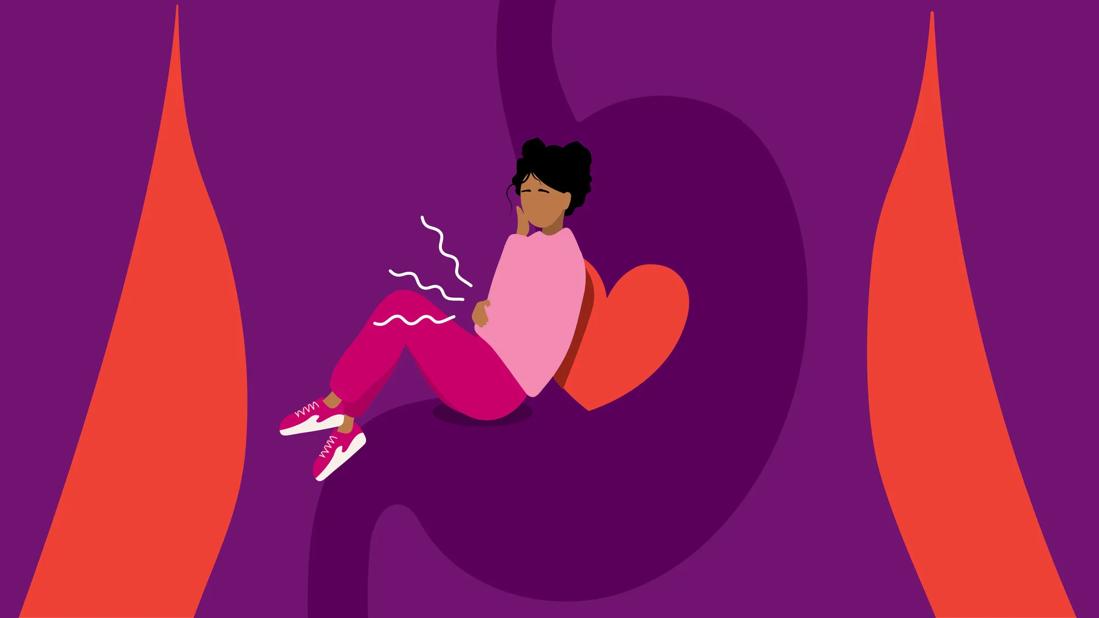Look for signs like withdrawing from social eating and not gaining weight — and get treatment early if possible

Image content: This image is available to view online.
View image online (https://assets.clevelandclinic.org/transform/542ec239-a4e1-48c8-9d70-47ecc429f05b/eating-disorders-teens-1493508272)
Teen sitting with hunger pains on oversized stomach, with heart
No one will doubt that the teenage years can be a tough time. Hormones raging. Acne popping. That feeling that everyone else knows what they’re doing while you’re flailing around in that time between childhood and grown-up life.
Advertisement
Cleveland Clinic is a non-profit academic medical center. Advertising on our site helps support our mission. We do not endorse non-Cleveland Clinic products or services. Policy
It’s stressful. And raising a teenager can feel equally daunting.
Among your (probably many) concerns? Whether your teen’s relationship with food is a healthy one. Especially in an age of social media where societal pressures to conform to a certain body image have triggered more and more headlines about eating disorders in teens.
What’s a parent/caregiver/guardian/coach/teacher/loved one to do?
Psychologist and weight management specialist Leslie Heinberg, PhD, shares advice.
The American Academy of Child & Adolescent Psychiatry estimates that as many as 10 in 100 young women (that’s 10%) have an eating disorder. That’s an alarming statistic, especially when you consider just how dangerous eating disorders can be.
But before we get to all that, let’s consider some context before jumping to conclusions about whether the teen in your life could have an eating disorder.
If you take Hollywood’s word for it, popular, rich, white teen girls are the ones who develop eating disorders. And while they certainly can be at risk, they’re far from alone. And newer research is changing perceptions about who lives with an eating disorder.
“Historically, the focus on eating disorders came from studies of anorexia and bulimia that focused on young, white women,” Dr. Heinberg points out. “But eating disorders affect people across ages, sexes, racial and ethnic backgrounds, economic means and social status.
Advertisement
“There are groups that were largely ignored and weren’t screened. People weren’t asking those questions because we thought, Oh, this is something for thin, young, white girls. But now we know that’s not the case at all.”
In other words, anyone can develop an eating disorder. And the teen years can be a trigger for some people. So, the more you know about what to look for and what to do, the better.
As with so many physical and mental health conditions, there’s no one reason people develop eating disorders. But Dr. Heinberg says that there are a few reasons why teens can be particularly vulnerable:
Taken together, it can create a perfect storm for teenagers to develop eating disorders.
The signs of eating disorders can vary. There are five different eating disorders recognized in The Diagnostic and Statistical Manual of Mental Disorders, Fifth Edition (DSM-5-TR) — the reference book healthcare professionals use to diagnose eating disorders and other mental health conditions. They are:
Each eating disorder has its own set of symptoms and criteria for diagnosis. But in general, Dr. Heinberg suggests watching your teen for signs of an eating disorder, like:
Treating an eating disorder takes time, patience and concentrated efforts focused on recovery.
And proper treatment is important. Eating disorders can affect your teen’s health, including their mental and emotional well-being and their physical health. Eating disorders can also cause malnutrition, which can affect your teen’s entire body, from their heart to their digestive system, immune system and more. In the most serious cases, eating disorders can be life-threatening.
Advertisement
Working with a qualified healthcare professional is your best route for a successful recovery. And for teens and other young people, expect the whole family to take part in their journey.
“The best eating disorder treatment for children and adolescents are family-based interventions in which their parents and guardians help them with their eating,” Dr. Heinberg elaborates. “And that should be done under the guidance of a qualified healthcare professional who can support both the teen and the adults in their lives, teach them about their condition and monitor their recovery.”
If you notice signs of an eating disorder or your teen engaging in potentially unhealthy eating behaviors, Dr. Heinberg recommends seeking help fast.
“If there are concerns, don’t wait,” she urges. “Talk to a pediatrician. Get them assessed. It’s much easier to turn around disordered eating or an eating disorder early on. An eating disorder that has really taken hold can become more difficult to treat.”
Advertisement

Sign up for our Health Essentials emails for expert guidance on nutrition, fitness, sleep, skin care and more.
Learn more about our editorial process.
Advertisement
Changes in your child’s emotions, behavior, sleep and appetite can all point to depression
The need for sleep often takes a back seat for teens, but they need eight to 10 hours of sleep to stay mentally healthy, strengthen their brains and prevent injury
Integrating coping skills into your teen’s daily routine helps turn self-care into a lifelong healthy habit
Talking in the car, resisting the urge to judge and asking specific questions can help rebuild rapport
The vagina is full of healthy and unhealthy bacteria, so discharge can be normal or problematic
Eat the right foods, and get plenty of sleep and exercise
Parents must intervene, in a productive way
A pediatric neurologist explains the troubling rise in teens with tics
Although it could be used as a moisturizer, this new trend is not recommended
Communicating clear limits helps protect your time, energy and emotional well-being
High cholesterol can be genetic, but testing and treatment can lower your heart disease risk